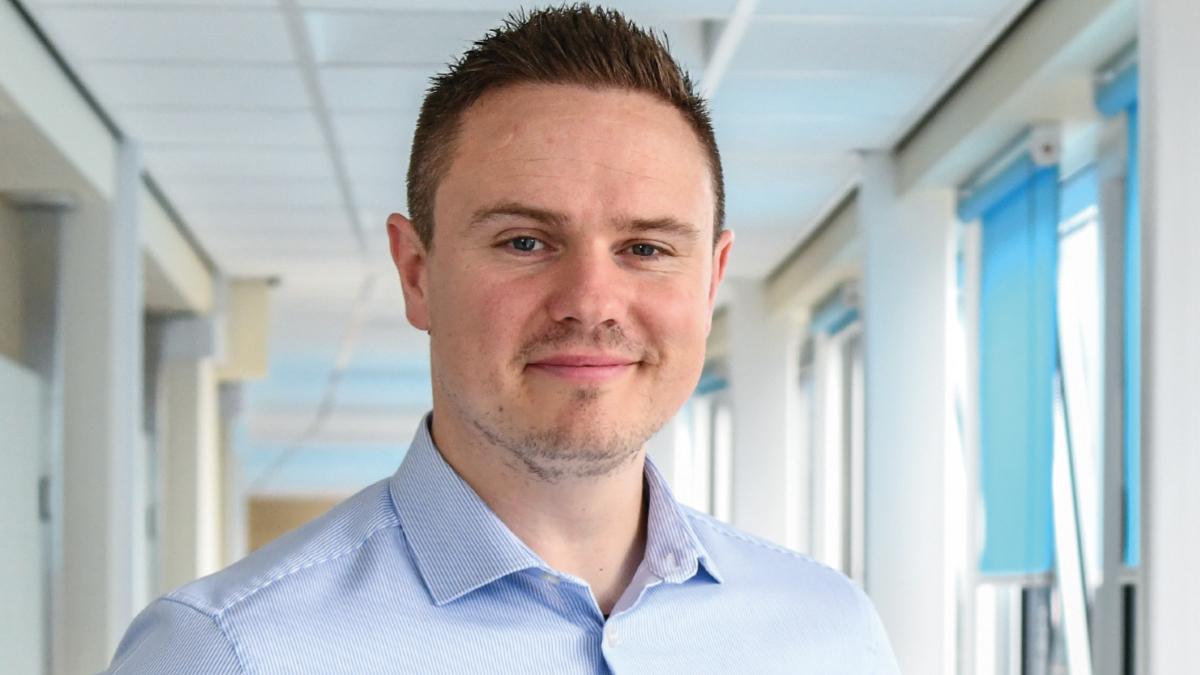NHS Gloucestershire’s health and social care commissioning manager reveals how he moved from a physio role into leadership and management. Catherine Turnbull reports

Whilst many physios progress through the NHS on a journey into a management role, James Mitchell’s career path began, and was supported by the private sector.
For a year he has been health and social commissioning manager for rehabilitation at NHS Gloucestershire integrated commissioning directorate after significant background experience as a chartered physiotherapist working with people with complex neurological and respiratory conditions.
‘I chose physiotherapy relatively late, in my early 20s when I was employed at a private neuro rehab centre as a therapy assistant. I worked quite closely with patients and this became an interesting option for me,’ James explains.
He trained at the University of Essex, gaining a BSc in physiotherapy in 2009. As he continued to work as a therapy assistant, he was sponsored and supported by his employer.
‘It meant I could apply a lot of the academic and theoretical knowledge that I was learning at university in practise almost on a weekly basis.
‘I had access to physios who were really supportive, and it enabled me, I think, to become a better physio on qualification because I was applying a lot of things to practise.’
After qualifying James moved to a large organisation, Ramsay Health Care, again in a complex neuro rehabilitation centre in Hertfordshire, and worked in a junior, and later senior physiotherapist role.
Although he has specialised in rehab, he says: ‘We had a wide range of patients there with very complex disabilities and that was insightful for me as a junior physio because I was being exposed to all these different complex disabilities and pathways.’
He was part of an MDT, which he found fascinating, and he could rotate at the company’s adjacent hospital, which catered for elective orthopaedics, to gain more experience. ‘I’ve spoken to a lot of physios in the past about this and sometimes I’ve questioned whether I missed out by not having done a core set of rotation, but I don’t think I’d change anything because of the patients that I met.
‘Quite quickly into my senior role, I got my first managerial role as a therapy manager with the same company, but in a neuro rehabilitation centre in Gloucester,’ James says. ‘So, I packed my bags and went across the country.’
James managed a team of occupational therapists, speech language therapists, physios, activity organisers and therapy assistants.
Again, he was supported by his organisation, this time to gain his level 5 in leadership and management in health and social care.
‘I could see the academic and the theoretical models associated with leadership and management, and that inspired me to progress in this area. My view is that leadership and management is a completely different role because it requires different skills, knowledge, abilities.

‘When you manage and lead therapists of different disciplines that can be really challenging as quite a young manager, which I was at the time. So having a level 5 gave me some confidence to be able to perform in my role to the level that I wanted. I decided to study my level 6, which bolstered my knowledge further.’
In 2017 he went on to work as an operations manager for a private care company to further his leadership career but maintained his physiotherapy skills and registration through private practise work.
‘Balancing the two sometimes was quite challenging because it almost felt like I had two jobs,’ he admits.
In just under two years, he returned to Ramsay Health Care as a neuro pathway and development manager.
‘I was leading the education side of the organisation for nurses, therapists and health care assistants. I had a lot of close links with the universities and started a level 7.’
However, he applied and was successful for his current post as a health and social commissioning manager in rehabilitation, because he saw a huge amount of potential as a commissioner to implement positive change on a much bigger scale.
How does he feel about his journey from the private sector to the NHS? ‘I’ve always worked in partnership with the NHS but not been directly employed, through circumstance and the opportunities that I had.

‘I think that puts me in a unique position in the context of commissioning because I’m coming in with a fresh set of eyes that aren’t NHS eyes. I’m not saying that it makes me necessarily more critical, but it certainly enables me to see the bigger picture and to bring a health and social care background too, which I think is important.
‘It has been a big cultural difference, but one of the things that I’m really excited about is joining an integrated care board, which are relatively new.’
He believes that physios are well suited to a commissioning role because they communicate across diverse teams and work in partnership with other disciplines and patient engagement. His line manager Sri Sabapathy is a clinical lead therapist and physio.
Commissioning he says, is essentially about procurement, contract management and strategic planning, and monitoring and evaluating services.
‘We design services as well and are heavily engaged with ensuring they meet the needs of the local population.’
He says that reviewing services and assessing needs can be put into a physiotherapy context.
‘I feel I have the skills, the knowledge and the experience to participate, not only because I’ve had academic and theoretical knowledge. I have worked with individuals who are using these services, certainly within the context of rehabilitation.’
Evidence from the CSP around community rehabilitation standards have been pivotal to how he has commissioned and helps him to stay connected to the wider world of physio. He goes as far as to say he would like to see a CSP network for physios in commissioning.
He would encourage early career physios keen to progress into leadership and management in commissioning to consider how physio students support other students and graduates support therapy, as these are key concepts that can be developed at an early stage.
It is key to recognise your skills and decide whether you might like to manage in a more formal capacity, whether that be supervising juniors, managing a small team or whatever it might be.
‘It is important to discuss your ambition with leads and your managers early on, and important for those managers to identify that those skills are being developed by the individuals as well. Nurture those skills, nurture the development and provide access to courses.
‘It’s been a really exciting journey and I’m thrilled to be in a commissioning role.’
CSP professional adviser Jackie Lidgard:
‘It’s fantastic to see physiotherapists using skills gained clinically and in more traditional management positions, to move into an increasing variety of roles. By nature of our training and our understanding of rehabilitation services, physios bring in-depth knowledge and unique viewpoints to commissioning roles. We’ve the benefit of personal experience working with and communicating with, clinicians, patients, and the wider rehabilitation MDT. ‘This helps us bring the views and voices of the people involved across the whole rehabilitation pathway into commissioning, allowing everyone to influence and shape services. This enables true co-production of services that best meet local population needs. The use of the Community Rehabilitation Best Practice Standards can help support evidence-based quality rehabilitation across the pathway and can be a basis of discussion at all levels to show areas of good practice and areas for improvement.’
Find Out More
Number of subscribers: 1




































